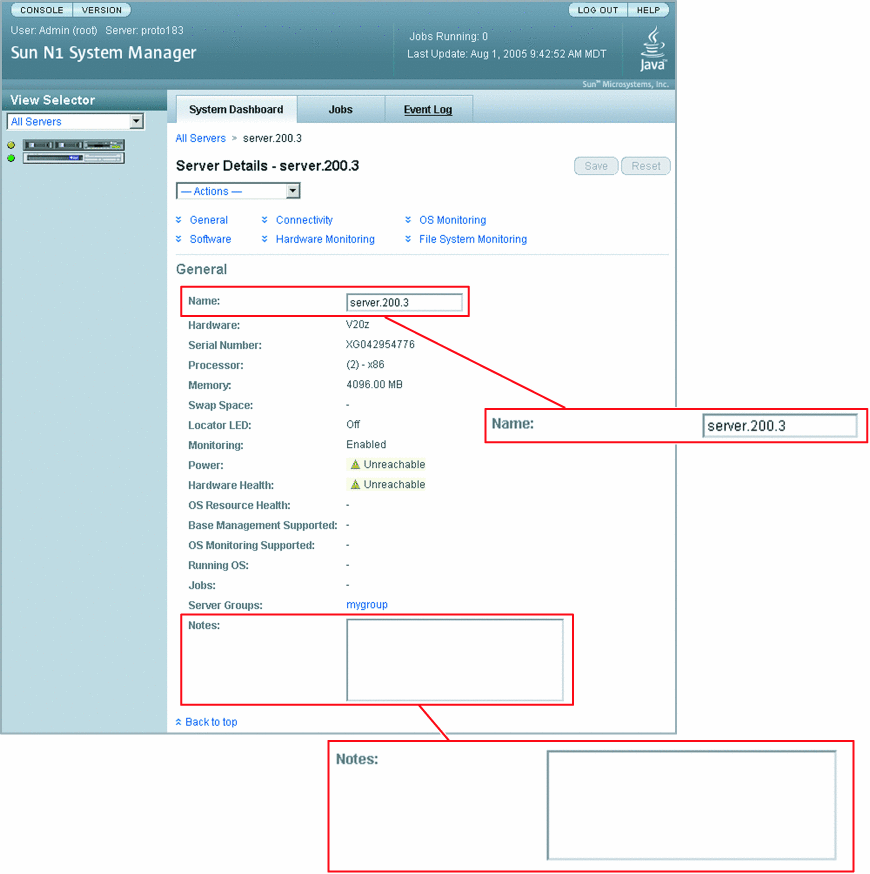Modifying Server and Server Group Information
This section describes the following tasks:
The following graphic illustrates how to rename servers and server groups by using the Server Details page. Alternatively, use the set command with the server or group keyword and the name subcommand. For syntax and parameter details, type help set server or help set group at the N1–ok command line.

Renaming a Server or a Server Group
Servers are identified by the management IP address that is specified during discovery. This name is also referred to as the management name in documentation. You might want to rename a server with the DNS host name or track the host name by adding it to the server notes. Server and server group names must be unique and may include letters A through Z, digits 0 through 9, hyphens, and underscore characters.
 To Rename
a Server or a Server Group
To Rename
a Server or a Server Group
This procedure describes how to rename a server or a server group by using the browser interface. The example that follows the procedure provides a command-line equivalent.
Steps
-
Log in to the N1 System Manager.
See To Access the N1 System Manager Browser Interface for details.
-
Choose All Servers from the View Selector menu.
The Servers table appears.
-
Select the server name that you want to change.
The Server Details page appears.
-
Type the new name into the Name entry field.
Server names must be unique and may include letters A through Z, digits 0 through 9, hyphens, and underscores.
The Save button on the right side of the page is enabled.
-
Click the Save button to apply the new name.
The Servers table appears with the renamed server.
Example 4–6 Renaming a Server Through the Command Line
The following example shows how to change a server name by using the set command.
N1-ok> set server 192.168.12.1 name=svr4rck7 |
The server name is changed to svr4rck7. See set server in Sun N1 System Manager 1.1 Command Line Reference Manual for details.
Example 4–7 Renaming a Group Through the Command Line
The following example shows how to change a server group name by using the set command.
N1-ok> set group devgroup name=labgroup |
The group name is changed to labgroup. See set group in Sun N1 System Manager 1.1 Command Line Reference Manual for details.
Adding a Server Note
Consider saving the following types of data as a server note:
-
Physical location such as rack, slot, building, and geographic region
-
DNS host name
-
Provisioning parameters and the network configuration information that is set for the OS profile installation
-
Internal asset tracking identifiers
To add server notes, use the set command with the server keyword and the note subcommand. For syntax and parameter details, type help set server at the N1–ok command line or refer to set server in Sun N1 System Manager 1.1 Command Line Reference Manual.
 To Add a Server
Note
To Add a Server
Note
This procedure describes how to add a server note by using the browser interface. The example that follows the procedure provides a command-line equivalent.
Steps
-
Log in to the N1 System Manager.
See To Access the N1 System Manager Browser Interface for details.
-
Choose All Servers from the View Selector menu.
The Servers table appears.
-
Select the name of the server.
The Server Details page appears.
-
Scroll down to the Notes entry field.
The Notes entry field appears at the bottom of the General section.
-
Type new data into the Notes field.
The Save button is enabled.
-
To apply your changes, click the Save button.
The new data is saved.
Example 4–8 Adding a Server Note Through the Command Line
The following example shows how to view any existing notes by using the show command.
N1-ok> show server server1 |
The output shows any existing notes.
The following example shows how to add a server note by using the set command.
N1-ok> set server server1 note="loaded with S10" |
The note is added to the server information. See set server in Sun N1 System Manager 1.1 Command Line Reference Manual for details.
- © 2010, Oracle Corporation and/or its affiliates
